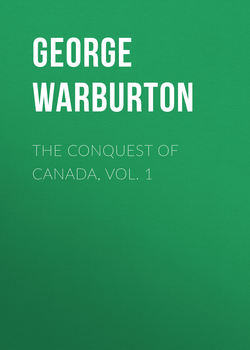The Conquest of Canada, Vol. 1

Реклама. ООО «ЛитРес», ИНН: 7719571260.
Оглавление
George Warburton. The Conquest of Canada, Vol. 1
INTRODUCTION
CHAPTER I
CHAPTER II
CHAPTER III
CHAPTER IV
CHAPTER V
CHAPTER VI
CHAPTER VII
CHAPTER VIII
CHAPTER IX
CHAPTER X
CHAPTER XI
CHAPTER XII
CHAPTER XIII
CHAPTER XIV
CHAPTER XV
Отрывок из книги
England and France started in a fair race for the magnificent prize of supremacy in America. The advantages and difficulties of each were much alike, but the systems by which they improved those advantages and met those difficulties were essentially different. New France was colonized by a government, New England by a people. In Canada the men of intellect, influence, and wealth were only the agents of the mother country; they fulfilled, it is true, their colonial duties with zeal and ability, but they ever looked to France for honor and approbation, and longed for a return to her shores as their best reward. They were in the colony, but not of it. They strove vigorously to repel invasion, to improve agriculture, and to encourage commerce, for the sake of France, but not for Canada.
The mass of the population of New France were descended from settlers sent out within a short time after the first occupation of the country, and who were not selected for any peculiar qualifications. They were not led to emigrate from the spirit of adventure, disappointed ambition, or political discontent; by far the larger proportion left their native country under the pressure of extreme want or in blind obedience to the will of their superiors. They were then established in points best suited to the interests of France, not those best suited to their own. The physical condition of the humbler emigrant, however, became better than that of his countrymen in the Old World; the fertile soil repaid his labor with competence; independence fostered self-reliance, and the unchecked range of forest and prairie inspired him with thoughts of freedom. But all these elevating tendencies were fatally counteracted by the blighting influence of feudal organization. Restrictions, humiliating as well as injurious, pressed upon the person and property of the Canadian. Every avenue to wealth and influence was closed to him and thrown open to the children of Old France. He saw whole tracts of the magnificent country lavished upon the favorites and military followers of the court, and, through corrupt or capricious influences, the privilege of exclusive trade granted for the aggrandizement of strangers at his expense.
.....
But not even the genius of the great minister, aided as it was by the awakened spirit of the British people, would have sufficed to rend Canada from France without the concurrent action of many and various causes: the principal of these was, doubtless, the extraordinary growth of our American settlements. When the first French colonists founded their military and ecclesiastical establishments at Quebec, upheld by the favor and strengthened by the arms of the mother country, they regarded with little uneasiness the unaided efforts of their English rivals in the South. But these dangerous neighbors rose with wonderful rapidity from few to many, from weak to powerful. The cloud, which had appeared no greater than "a man's hand" on the political horizon, spread rapidly wider and wider, above and below, till at length from out its threatening gloom the storm burst forth which swept away the flag of France.
As a military event, the conquest of Canada was a matter of little or no permanent importance: it can only rank as one among the numerous scenes of blood that give an intense but morbid interest to our national annals. The surrender of Niagara and Quebec were but the acknowledgment or final symbol of the victory of English over French colonization. For three years the admirable skill of Montcalm and the valor of his troops deferred the inevitable catastrophe of the colony: then the destiny was accomplished. France had for that time played out her part in the history of the New World; during one hundred and fifty years her threatening power had served to retain the English colonies in interested loyalty to protecting England. Notwithstanding the immense material superiority of the British Americans, the fleets and armies of the mother country were indispensable to break the barrier raised up against them by the union, skill, and courage of the French.
.....